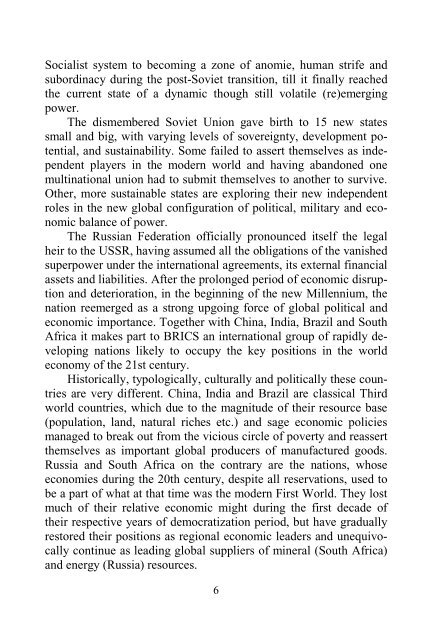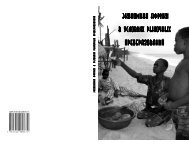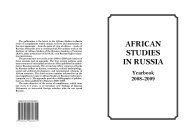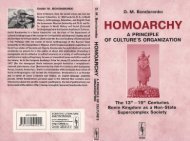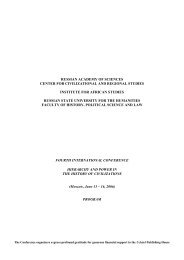L. Fituni, I. Abramova Resource Potential of Africa and Russia's ...
L. Fituni, I. Abramova Resource Potential of Africa and Russia's ...
L. Fituni, I. Abramova Resource Potential of Africa and Russia's ...
Create successful ePaper yourself
Turn your PDF publications into a flip-book with our unique Google optimized e-Paper software.
Socialist system to becoming a zone <strong>of</strong> anomie, human strife <strong>and</strong><br />
subordinacy during the post-Soviet transition, till it finally reached<br />
the current state <strong>of</strong> a dynamic though still volatile (re)emerging<br />
power.<br />
The dismembered Soviet Union gave birth to 15 new states<br />
small <strong>and</strong> big, with varying levels <strong>of</strong> sovereignty, development potential,<br />
<strong>and</strong> sustainability. Some failed to assert themselves as independent<br />
players in the modern world <strong>and</strong> having ab<strong>and</strong>oned one<br />
multinational union had to submit themselves to another to survive.<br />
Other, more sustainable states are exploring their new independent<br />
roles in the new global configuration <strong>of</strong> political, military <strong>and</strong> economic<br />
balance <strong>of</strong> power.<br />
The Russian Federation <strong>of</strong>ficially pronounced itself the legal<br />
heir to the USSR, having assumed all the obligations <strong>of</strong> the vanished<br />
superpower under the international agreements, its external financial<br />
assets <strong>and</strong> liabilities. After the prolonged period <strong>of</strong> economic disruption<br />
<strong>and</strong> deterioration, in the beginning <strong>of</strong> the new Millennium, the<br />
nation reemerged as a strong upgoing force <strong>of</strong> global political <strong>and</strong><br />
economic importance. Together with China, India, Brazil <strong>and</strong> South<br />
<strong>Africa</strong> it makes part to BRICS an international group <strong>of</strong> rapidly developing<br />
nations likely to occupy the key positions in the world<br />
economy <strong>of</strong> the 21st century.<br />
Historically, typologically, culturally <strong>and</strong> politically these countries<br />
are very different. China, India <strong>and</strong> Brazil are classical Third<br />
world countries, which due to the magnitude <strong>of</strong> their resource base<br />
(population, l<strong>and</strong>, natural riches etc.) <strong>and</strong> sage economic policies<br />
managed to break out from the vicious circle <strong>of</strong> poverty <strong>and</strong> reassert<br />
themselves as important global producers <strong>of</strong> manufactured goods.<br />
Russia <strong>and</strong> South <strong>Africa</strong> on the contrary are the nations, whose<br />
economies during the 20th century, despite all reservations, used to<br />
be a part <strong>of</strong> what at that time was the modern First World. They lost<br />
much <strong>of</strong> their relative economic might during the first decade <strong>of</strong><br />
their respective years <strong>of</strong> democratization period, but have gradually<br />
restored their positions as regional economic leaders <strong>and</strong> unequivocally<br />
continue as leading global suppliers <strong>of</strong> mineral (South <strong>Africa</strong>)<br />
<strong>and</strong> energy (Russia) resources.<br />
6


